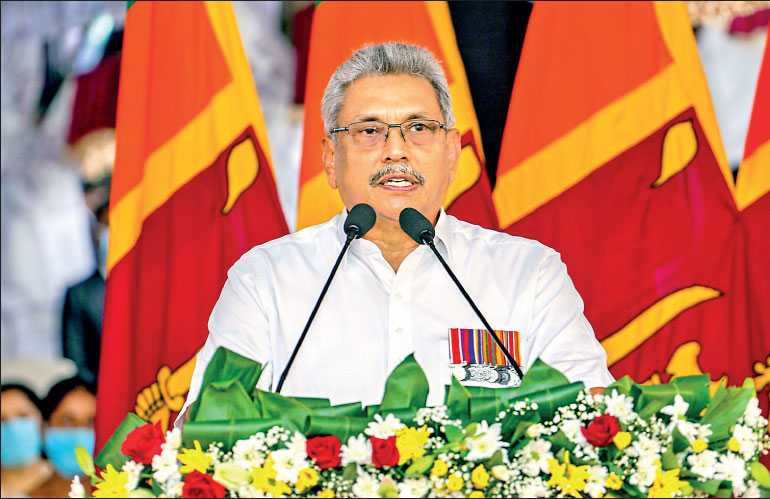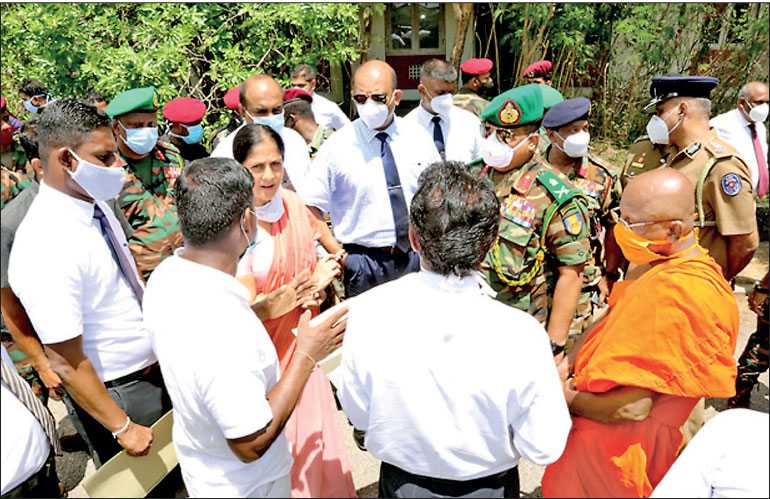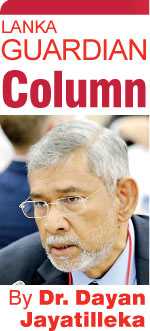Monday Feb 16, 2026
Monday Feb 16, 2026
Thursday, 21 May 2020 00:20 - - {{hitsCtrl.values.hits}}

President Gotabaya Rajapaksa at the Victory Day commemoration on Wednesday. Today, in the face of facts to the contrary, the dominant discourse claims that the Sri Lankan military was “the only one to defeat terrorism”, and the ‘unique’, presidentially-inspired, military-and-intelligence-led Sri Lankan model is a global example and inspiration in the anti-COVID campaign. Which domain will the model not extend to?

What is the perceived threat to national security that warranted a rushed visit by the Secretary Defence, himself a famous combat general, and two serving chiefs of the armed forces (with the only absentee being the Air Force Chief) to the Muhudu Maha Vihara and Digavapi in the Eastern Province?
The footage on TV news was straight out of my favourite Netflix series. A long convoy of glossy black four-wheel drives coming down a dusty road with a heat haze shimmering in the background. Elite guards in red berets and body-armour, sunshades and carrying Heckler-and-Koch MP6s dismount, escorting the Bosses, also in shades, one in civvies and tie, the others in uniform. Marking it a South Asian rather than Latin American setting is a puff of pink saree in a bustle. Cut to a sitting room in which the heavy-hitters are in conversation with venerable members of the Buddhist clergy. 
The Secretary/Defence General Kamal Gunaratne and the Army and Navy Chiefs took time off from spearheading the anti-corona campaign to visit the Muhudu Maha Vihara and Digavapi in the Eastern Province.
LankaCNews headlined the story thus: “On the orders of the President, the Secretary of Defence arrives at Muhudu Maha Vihara with the Tri-Services…erects military encampment to save the heritage.”
A TV station friendly towards the administration gave more detail.
“Defence Secretary Maj. Gen. (Retd) Kamal Gunaratne has pledged to protect and preserve archaeological and historic sites from vandalism and encroachments by individuals and organised groups. He gave this assurance when he met some villagers and Buddhist priests during his visit to Muhudu-Maha Viharaya and Deegawapiya archaeological sites in the Ampara District in the Eastern Province on Thursday (May 14).
…Following instructions of the Defence Secretary, a naval sub-unit has been established to maintain the security in the environs of the Muhudu Maha Viharaya, an ancient Buddhist temple in Pottuvil. He said encroachment taking place in the Viharaya land would not be allowed and informed the Chief Incumbent of the temple Ven. Warakapola Indratissa Thera, who briefed the situation in the area, that a meeting would be arranged with the relevant authorities to discuss the issues, soon.
Ven. Indratissa Thera informed the Defence Secretary that the land area of 72 acres declared in 1951 by the then Commissioner General of Archaeology Senarath Paranawitana was reduced to 32 acres by a gazette notification in 1965. “There are 42 families in the land now and they are encroaching the remaining temple land,” he said, requesting the Defence Secretary to solve the issue urgently.
… Eastern Province Governor Anuradha Yahampath, Sri Lanka Army Chief Lt. Gen. Shavendra Silva, Sri Lanka Navy Commander Vice Admiral Piyal De Silva, Acting IGP C. D. Wickramaratne, and Security Forces Commander (East) Maj. Gen. Rasika Fernando also visited these sites with the Defence Secretary.” (Ada Derana)
Military in civic disputes
There were no reports of armed violence surrounding the case. From what I’ve read there is the issue of a fence and at worst a threat of hooliganism. It is not as if there was a war on and this was a visit to a courageous Buddhist monk like Ven. Kithalagama Seelalankara better known as Dimbulagala Hamuduruwo, holding the line in a “border area” against terrorist incursions. 
What there did seem to be was a longstanding civic dispute arising from possible/probable encroachment. Surely these are matters that fall under the purview of dispute resolution at best and the Police and the Courts at the most?
If such a dispute occurred in a Sinhala majority area between two groups or establishments of Sinhala-Buddhists, it is unlikely that the top brass would have rushed there and a military encampment set up. Why then is it happening in a sensitive multi-ethnic, multi-religious, multilingual area such as the Eastern Province? Surely the setting up of a Police post and regular mobile Police patrols would have been the correct and proportionate response?
If the encroachment has been persistent, why not have the Attorney-General prosecute the wrong-doers?
What is the perceived threat to national security that warranted a rushed visit by the Secretary Defence, himself a famous combat general, and two serving chiefs of the armed forces (with the only absentee being the Air Force Chief)?
The Sri Lankan Defence Ministry and its military, like any other in any part of the world, deals with armed threats to the State, from external or internal sources. There seems to be no such phenomenon at work here, going even by the statements of the venerable clergy.
Military as first responder
Surely, there has to be an investigation and every side of the story has to be examined and fact-checked, perhaps by an independent high-level commission of respected former civil servants drawn from all three communities. From the remarks in the official media release accompanying the visit of the Secretary/Defence, there aren’t two sides to this story. The Secretary was seen on TV news, musing quizzically about the diminishing of the extent of the temple’s landholdings from 1951, to 1965, listed on both occasions by the state authorities of the day, which was when we had a superb system of state administration (the GAs of the days were or became renowned civil servants). The current official discourse assumes that the matter is open-and-shut, and that the military arm of the state shall intervene on one side.
Is it that under the new regime, the definitions of national security and threat to the defence of the State, have been transformed? Have the definitions of “national”, “state”, “defence”, “security” and “threat” undergone a seismic shift?
Are the Defence Ministry and the military changing to an active interventionist role in local/civic disputes even when there is no violent conflict or armed enemy involved?
The universal norm is that the Police handles local disputes up until the moment a clash has escalated to the point it can no longer hold the line, and then it calls in forces from the next level—in some countries, the SWAT or federal police, and in Sri Lanka, the STF—with the armed forces being called in only as a last resort when there is armed violence of a certain level of intensity.
Why is a military camp—rather than a Police station—being established when there is no strategic or tactical criterion involved, not least because there is no armed threat or armed enemy?
Universally, the military is the last resort of the state. In Sri Lanka, it is now the first resort.
What’s wrong with this picture?
Are the very identity and function of the defence apparatus and military machine in a multi-ethnic, multi-religious, multilingual milieu, being currently redefined?
Even more fundamentally, is the very identity, role, function and character of the Sri Lankan State itself—of which the military is the sword and shield—being radically redefined by the new regime?
If so, what does it reveal of the guiding ideology and the final form of the State once the reshaping is done?
The high-level visit to the Muhudu Maha Vihara showed that what was perhaps latent, subterranean or secondary earlier is now manifest and dominant. The nexus between the country’s leadership, the top defence bureaucracy, the Governor, the Buddhist clergy and temples, the military, and State policy –encompassing national security definitions and decisions – is either transparently clear as it has never been before, or has become what it has never been before.
The photograph of the gesturing Governor, the Defence Secretary, the Army Commander, and the Buddhist clergy, tells the tale that that the Sri Lankan State is already functioning as a Sinhala-Buddhist state. The State is no longer a holistic, arbitrating, ‘umpire’ or ‘balancer’ state—which is what it should become in postwar Sri Lanka (as urged by the LLRC), whatever role of patron/protector it had to play in warzones, especially ‘border/buffer zones’, in wartime. Are the Sri Lankan State and its military are being reprogrammed to function as partial and sectarian structures?
Under a new Constitution, the Sri Lankan State machine’s new direction and character will be given formal codification as armature of monoethnic, mono-religious, monolingual, monocultural domination, crowding out or reducing ‘the Others’ to subaltern status.
The same tale unfolded not so long ago in a country far away, but emotionally and politically close to Ceylon/Sri Lanka; a country that no longer exists, because its State and armed forces, once loved by all its communities as composite, common, overarching, neutral and defensive, were later transformed under a new President elected (and pressured) by the radical majoritarian-nationalists, into the aggressively interventionist and hegemonic instrument of the atavistic sentiments of the larger ethno-religious community in a multi-ethnic, multilingual, multi-religious, multicultural society.
That country was (former) Yugoslavia.
One is usually happy at the prospect that a prognosis in print by one’s well-known and respected father may be judged prophetic, but in this case, I would be quite saddened. Those who have back issues of the Lanka Guardian will see the grim question raised on the periodical’s cover by Mervyn de Silva: “Will the East become Sri Lanka’s Bosnia?”
GR model goes global
The Economist (London) was famously photographed sticking out of the back-pocket of President George Bush Sr. while walking across the White House lawn. It is read by almost all world leaders, foreign ministers and top decision-makers.
Reading the 14 May 2020 Asia edition of arguably the world’s most prestigious periodical, the global governing elites will see the caption of the regular column ‘Banyan’. It is accompanied by a colourful graphic of three mustachioed and bespectacled gentlemen seated at a table, clad in suit coats and ties above the table and camouflage fatigues and boots below it. The columnist refers to conversations with candidate Rajapaksa and the column’s caption sums things up for the journal’s influential readers thus: ‘Sri Lanka’s new president is putting soldiers in charge of everything’.
It observes:
“…Yet few predicted the extent to which under Gota’s rule military types would move into senior positions in government, development and even health, fighting the covid-19 epidemic.
…Moreover, the commanders’ claims of COVID-competence have been undermined by outbreaks on military bases. Of 900-odd reported cases in Sri Lanka, over 500 are members of the armed forces or their close contacts.
Nor is there much reason to believe that military men will do a better job of running ports, reducing poverty or increasing crop yields. For now, the main question is accountability. The positions filled by officers have little civilian oversight.
It does not help that Mr. Rajapaksa has dissolved the old parliament, while elections for a new one have been thwarted by the epidemic. The president and his aides govern by decree.” (https://www.economist.com/asia/2020/05/14/sri-lankas-new-president-is-putting-soldiers-in-charge-of-everything)
Expertise is the product of education and experience. Excellence is the result of education, experience and expertise.
The secret of Sri Lanka’s victory in the war against the world’s worst terrorist movement was the excellence of our military, resulting from the training (from diverse international sources) and accumulated combat experience of its officer corps. These principles, namely training (education, learning and practice) and experience (actual engagement) are universally valid and apply to each distinct sphere of endeavour.
So, when the Cambridge and Harvard-educated Dr. Ravindra Ranan-Eliya and his team produce a workup of the Johns Hopkins data of country performance against Covid-19 and graphically prove that Sri Lanka, with or without the Navy cluster, is not among the dozen “superstar” performers—which include Cambodia and Mauritius—against the coronavirus, I go by that. (http://www.dailymirror.lk/news-features/Eliminating-crushing-COVID-is-possible-and-these-countries-are-the-Superstars/131-188349)
One cannot attract and assemble/network the best Lankan experts, including in the diaspora, in the medical or any field whatsoever (e.g. Australia-based Prof. Raina Macintyre, top epidemiologist), if the criteria is not performance-based expertise but ‘loyalty’ and ‘nationalism’ endorsed by the ultranationalist-xenophobic caucuses. Why aren’t we reaching out to our close neighbour we used to pride ourselves we were so similar to, namely Kerala, which has been a resounding anti-COVID success story (acknowledged in an MIT publication)? And why not our ‘superstar’ Afro-Asian friends Vietnam, S. Korea, Cambodia and Mauritius?
One cannot learn from best practices the world over if one’s axiomatic starting point is that we ourselves have, and cannot but have, the best practices.
“Mirror, mirror, on the wall/who has the best model of all?” The vested interest in the ideological ‘construct’ of an intrinsically superior indigenous model automatically pre-empts any recognition of failure, rectification of error and search for a better way, thus blocking the process of learning and thinking, which is the basis of rationality and the scientific method, in turn the foundation of progress.
Omniscience and omnipotence
Our island was respected worldwide as a vibrant democracy which had never succumbed to military rule, with high social welfare/human development (PQLI, HDI) indicators, and a prestigious profile at the UN. A Third World rarity at the time when military rule was widespread, competitive civilian democracy was the basis of our “soft power”.
Today, in the face of facts to the contrary, the dominant discourse claims that the Sri Lankan military was “the only one to defeat terrorism”, and the ‘unique’, presidentially-inspired, military-and-intelligence-led Sri Lankan model is a global example and inspiration in the anti-COVID campaign. Which domain will the model not extend to?
The model that is being projected as infallible involves stakes so high that it precludes admission of errors in performance, still less design. The voicing of criticism of performance will inevitably be perceived as criticism of design, policy, organisational model, components, inspiration, leadership and entire project. Therefore, dissent within or outside the system will be seen as unpatriotic and treated as such.
The presumption of infallibility and omniscience requires and generates as corollary, the striving for omnipotence.
Inculcating the ideological fantasy of infallibility-superiority-perfection-impregnability is not necessary to win elections (against a divided Opposition). It may be necessary for durable domination, erecting a garrison-state edifice that stays entrenched for an era.
The model by its very nature, can accommodate only an echo chamber, and exist in one. It cannot tolerate checks-and-balances, which are perceived as impediments, if not sabotage.
The model operates as a superstructure above the PM and Cabinet.
By its inherently self-expansionist logic, the model is then extended to the whole system, occupying, enveloping and swallowing it. Soon, the model is the System.
This hyper-centralist model can be implemented in our pluralist, heterogeneous and individualist society only by ideological homogenisation and political regimentation, tightening command-and-control; straitjacketing.
Trumpeted as a quantum leap in efficiency and productivity, the model actually becomes dysfunctional. A democracy provides instant feedback for course-correction. A closed, militarised system cannot. Intelligence inputs cannot substitute for authentic feedback, just as a centralised state plan cannot substitute for myriad market signals. Though thinking of itself as panoptic due to its intelligence-gathering mechanisms, when deprived of the dense eco-system of open feedback of a pluralist democracy, the system becomes a Cyclops.
Cyclops lashes out at everything that moves or rustles.
This dark Dystopia can be avoided/reversed if an election is held and results not in a two-thirds majority that translates into hyper-presidentialism, but rather, in a comfortable limited majority which reactivates the prime minister-ship under the 19th Amendment, backed by a more self-assured Cabinet and Government Parliamentary Group, challenged by a progressive new Opposition. That apart, democrats the world over must bide their time.